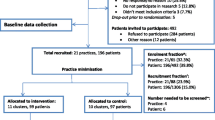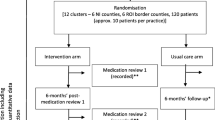Abstract
Background
The SENATOR trial intervention included the provision of computer-generated medication recommendations to physician prescribers caring for hospitalised older adults (≥ 65 years), with the aim of reducing in-hospital adverse drug reactions. Interim data analysis during the trial revealed that the prescriber implementation rates of the computer-generated STOPP/START recommendations were lower than expected across all six trial sites.
Aim
The aim of this qualitative study was to identify the factors affecting prescriber implementation of the medication recommendations in the SENATOR trial.
Methods
Semi-structured interviews were conducted with trial researchers and physician prescribers who were provided with SENATOR recommendations. Content analysis was used to identify the most relevant domains from the Theoretical Domains Framework (TDF) that affected recommendation uptake.
Results
Ten trial researchers and fourteen prescribers were interviewed across the six trial sites. Eight TDF domains were found to be most relevant in affecting prescriber implementation: ‘environmental context and resources’, ‘goals’, ‘intentions’, ‘knowledge’, ‘beliefs about consequences’, ‘memory, attention and decision processes’, ‘social/professional role and identity’, and ‘social influences’. Interviewees felt that there was often a disconnect between the time prescribers were reviewing the patient and the point at which the recommendations were provided. However, when recommendations were reviewed, prescriber inertia was highly pervasive, with a particular reluctance to make pharmacotherapy changes outside their own specialty. Implementation was facilitated by recommendations reaching a ‘decision-maker’, but this was often not possible as the software could not evaluate the entire clinical context of patients, and thus frequently produced recommendations of low clinical relevance.
Conclusion
This study has demonstrated that the clinical relevance of the SENATOR prescribing recommendations was a significant factor affecting their implementation. Whilst software refinement will be necessary to improve the quality of recommendations, future interventions will need to be multifaceted to overcome the complex prescriber specialty culture within the acute hospital environment.
Similar content being viewed by others
References
Dalton K, O’Brien G, O’Mahony D, Byrne S. Computerised interventions designed to reduce potentially inappropriate prescribing in hospitalised older adults: a systematic review and meta-analysis. Age Ageing. 2018;47(5):670–8.
O’Mahony D, O’Sullivan D, Byrne S, O’Connor MN, Ryan C, Gallagher P. STOPP/START criteria for potentially inappropriate prescribing in older people: version 2. Age Ageing. 2015;44(2):213–8.
O’Connor MN, O’Sullivan D, Gallagher PF, Eustace J, Byrne S, O’Mahony D. Prevention of hospital-acquired adverse drug reactions in older people using screening tool of older persons’ prescriptions and screening tool to alert to right treatment criteria: a cluster randomized controlled trial. J Am Geriatr Soc. 2016;64(8):1558–66.
Lewin S, Glenton C, Oxman AD. Use of qualitative methods alongside randomised controlled trials of complex healthcare interventions: methodological study. BMJ. 2009;10(339):b3496.
Oakley A, Strange V, Bonell C, Allen E, Stephenson J. Process evaluation in randomised controlled trials of complex interventions. BMJ. 2006;332(7538):413–6.
Lavan AH, O’Mahony D, Gallagher P, Fordham R, Flanagan E, Dahly D, et al. The effect of SENATOR (Software ENgine for the Assessment and optimisation of drug and non-drug Therapy in Older peRsons) on incident adverse drug reactions (ADRs) in an older hospital cohort—trial protocol. BMC Geriatr. 2019;19(1):40.
Braun V, Clarke V. Successful qualitative research: a practical guide for beginners. New York: Sage; 2013.
Tong A, Sainsbury P, Craig J. Consolidated criteria for reporting qualitative research (COREQ): a 32-item checklist for interviews and focus groups. Int J Qual Health Care. 2007;19(6):349–57.
Cane J, O’Connor D, Michie S. Validation of the theoretical domains framework for use in behaviour change and implementation research. Implement Sci. 2012;24(7):37.
Francis JJ, Johnston M, Robertson C, Glidewell L, Entwistle V, Eccles MP, et al. What is an adequate sample size? Operationalising data saturation for theory-based interview studies. Psychol Health. 2010;25(10):1229–45.
Hsieh HF, Shannon SE. Three approaches to qualitative content analysis. Qual Health Res. 2005;15(9):1277–88.
Atkins L, Francis J, Islam R, O’Connor D, Patey A, Ivers N, et al. A guide to using the Theoretical Domains Framework of behaviour change to investigate implementation problems. Implement Sci. 2017;12(1):77.
Anrys P, Boland B, Degryse JM, De Lepeleire J, Petrovic M, Marien S, et al. STOPP/START version 2-development of software applications: easier said than done? Age Ageing. 2016;45(5):589–92.
Craig P, Dieppe P, Macintyre S, Michie S, Nazareth I, Petticrew M. Developing and evaluating complex interventions: the new Medical Research Council guidance. BMJ. 2008;29(337):a1655.
O'Mahony D, Gudmundsson A, Soiza RL, Petrovic M, Cruz-Jentoft AJ, Cherubini A, et al. Prevention of adverse drug reactions in hospitalized older patients with multi-morbidity and polypharmacy: the SENATOR randomized controlled clinical trial. Age Ageing. 2020;49(4):605–14. https://doi.org/10.1093/ageing/afaa072
Lee EK, Mejia AF, Senior T, Jose J. Improving patient safety through medical alert management: an automated decision tool to reduce alert fatigue. AMIA Annu Symp Proc. 2010;2010:417–21.
Coombes ID, Stowasser DA, Coombes JA, Mitchell C. Why do interns make prescribing errors? A qualitative study. Med J Aust. 2008;188(2):89–94.
Lewis PJ, Ashcroft DM, Dornan T, Taylor D, Wass V, Tully MP. Exploring the causes of junior doctors’ prescribing mistakes: a qualitative study. Br J Clin Pharmacol. 2014;78(2):310–9.
Spinewine A, Schmader KE, Barber N, Hughes C, Lapane KL, Swine C, et al. Appropriate prescribing in elderly people: how well can it be measured and optimised? Lancet. 2007;370(9582):173–84.
Kawamoto K, Houlihan CA, Balas EA, Lobach DF. Improving clinical practice using clinical decision support systems: a systematic review of trials to identify features critical to success. BMJ. 2005;330(7494):765.
Thursky K. Use of computerized decision support systems to improve antibiotic prescribing. Expert Rev Anti Infect Ther. 2006;4(3):491–507.
Moxey A, Robertson J, Newby D, Hains I, Williamson M, Pearson SA. Computerized clinical decision support for prescribing: provision does not guarantee uptake. J Am Med Inform Assoc. 2010;17(1):25–33.
Stevenson KB, Barbera J, Moore JW, Samore MH, Houck P. Understanding keys to successful implementation of electronic decision support in rural hospitals: analysis of a pilot study for antimicrobial prescribing. Am J Med Qual. 2005;20(6):313–8.
Baysari MT, Westbrook JI, Richardson KL, Day RO. The influence of computerized decision support on prescribing during ward-rounds: are the decision-makers targeted? J Am Med Inform Assoc. 2011;18(6):754–9.
Roumie CL, Elasy TA, Wallston KA, Pratt S, Greevy RA, Liu X, et al. Clinical inertia: a common barrier to changing provider prescribing behavior. Jt Comm J Qual Patient Saf. 2007;33(5):277–85.
Anderson K, Freeman C, Rowett D, Burrows J, Scott I, Rigby D. Polypharmacy, deprescribing and shared decision-making in primary care: the role of the accredited pharmacist. J Pharm Pract Res. 2015;45(4):446–9.
Jones MI, Greenfield SM, Bradley CP. Prescribing new drugs: qualitative study of influences on consultants and general practitioners. BMJ. 2001;323(7309):378–81.
Cullinan S, Fleming A, O’Mahony D, Ryan C, O’Sullivan D, Gallagher P, et al. Doctors’ perspectives on the barriers to appropriate prescribing in older hospitalized patients: a qualitative study. Br J Clin Pharmacol. 2015;79(5):860–9.
Martin P, Tamblyn R, Benedetti A, Ahmed S, Tannenbaum C. Effect of a pharmacist-led educational intervention on inappropriate medication prescriptions in older adults: the D-PRESCRIBE randomized clinical trial. JAMA. 2018;320(18):1889–98.
Tannenbaum C, Martin P, Tamblyn R, Benedetti A, Ahmed S. Reduction of inappropriate benzodiazepine prescriptions among older adults through direct patient education: the EMPOWER cluster randomized trial. JAMA Intern Med. 2014;174(6):890–8.
Gordon M, Darbyshire D, Baker P. Non-technical skills training to enhance patient safety: a systematic review. Med Educ. 2012;46(11):1042–54.
Pohontsch NJ, Heser K, Loffler A, Haenisch B, Parker D, Luck T, et al. General practitioners’ views on (long-term) prescription and use of problematic and potentially inappropriate medication for oldest-old patients—a qualitative interview study with GPs (CIM-TRIAD study). BMC Fam Pract. 2017;18(1):22.
Ekdahl AW, Hellström I, Andersson L, et al. Too complex and time-consuming to fit in!. Physicians' experiences of elderly patients and their participation in medical decision making: a grounded theory study BMJ Open. 2012;2:e001063.
Prosser H, Almond S, Walley T. Influences on GPs’ decision to prescribe new drugs-the importance of who says what. Fam Pract. 2003;20(1):61–8.
Dalton K, O’Mahony D, O’Sullivan D, O’Connor MN, Byrne S. Prescriber implementation of STOPP/START recommendations for hospitalised older adults: a comparison of a pharmacist approach and a physician approach. Drugs Aging. 2019;36(3):279–88.
Campbell NC, Murray E, Darbyshire J, Emery J, Farmer A, Griffiths F, et al. Designing and evaluating complex interventions to improve health care. BMJ. 2007;334(7591):455–9.
Lawton J, Jenkins N, Darbyshire J, Farmer A, Holman R, Hallowell N. Understanding the outcomes of multi-centre clinical trials: a qualitative study of health professional experiences and views. Soc Sci Med. 2012;74(4):574–81.
Birken SA, Presseau J, Ellis SD, Gerstel AA, Mayer DK. Potential determinants of health-care professionals’ use of survivorship care plans: a qualitative study using the theoretical domains framework. Implement Sci. 2014;15(9):167.
Dyson J, Lawton R, Jackson C, Cheater F. Does the use of a theoretical approach tell us more about hand hygiene behaviour? The barriers and levers to hand hygiene. J Infect Prev. 2011;12(1):17–24.
Oates J. Use of Skype in interviews: the impact of the medium in a study of mental health nurses. Nurse Res. 2015;22(4):13–7.
Hanna P. Using internet technologies (such as Skype) as a research medium: a research note. Qual Res. 2012;12(2):239–42.
Pearson SA, Moxey A, Robertson J, Hains I, Williamson M, Reeve J, et al. Do computerised clinical decision support systems for prescribing change practice? A systematic review of the literature (1990–2007). BMC Health Serv Res. 2009;28(9):154.
Acknowledgements
The authors wish to thank all the interviewees who kindly agreed to participate in this study. In addition, the authors would like to acknowledge the SENATOR research teams at each of the six trial sites who facilitated the conduct of this study. Finally, the authors thank Jessica Coyne for her contribution to this work.
Author information
Authors and Affiliations
Corresponding author
Ethics declarations
Ethical Approval
Ethical approval for this study was granted by the Clinical Research Ethics Committee of the Cork Teaching Hospitals, Cork, Ireland. As well as this, local ethical approval was also granted at each RCT site where English was not the first language of participants (sites 3–6 in Table 1), with participant information sheets and consent forms also translated into the participants’ native language.
Funding
This qualitative study received funding from the SENATOR project, which was supported by the European Commission’s Seventh Framework Programme FP7/2007-2013 under Grant agreement number 305930. Kieran Dalton and Denis O’Mahony received funding for their normal roles within the SENATOR project, but no extra funding was received for their work on this qualitative study. The Commission had no part in the design of this study, the collection, analysis and interpretation of the data, the writing of the report, or the decision to submit the article for publication. This research was also supported by funding from a Study within a Trial (SWAT) award from the Heath Research Board Trials Methodology Research Network (HRB-TMRN).
Electronic Supplementary Material
Below is the link to the electronic supplementary material.
Rights and permissions
About this article
Cite this article
Dalton, K., O’Mahony, D., Cullinan, S. et al. Factors Affecting Prescriber Implementation of Computer-Generated Medication Recommendations in the SENATOR Trial: A Qualitative Study. Drugs Aging 37, 703–713 (2020). https://doi.org/10.1007/s40266-020-00787-6
Published:
Issue Date:
DOI: https://doi.org/10.1007/s40266-020-00787-6




